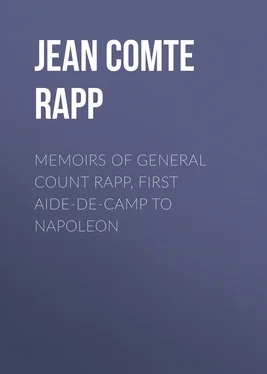Jean Comte Rapp - Memoirs of General Count Rapp, First aide-de-camp to Napoleon
Здесь есть возможность читать онлайн «Jean Comte Rapp - Memoirs of General Count Rapp, First aide-de-camp to Napoleon» — ознакомительный отрывок электронной книги совершенно бесплатно, а после прочтения отрывка купить полную версию. В некоторых случаях можно слушать аудио, скачать через торрент в формате fb2 и присутствует краткое содержание. Жанр: Биографии и Мемуары, История, foreign_edu, foreign_antique, foreign_prose, на английском языке. Описание произведения, (предисловие) а так же отзывы посетителей доступны на портале библиотеки ЛибКат.
- Название:Memoirs of General Count Rapp, First aide-de-camp to Napoleon
- Автор:
- Жанр:
- Год:неизвестен
- ISBN:нет данных
- Рейтинг книги:5 / 5. Голосов: 1
-
Избранное:Добавить в избранное
- Отзывы:
-
Ваша оценка:
- 100
- 1
- 2
- 3
- 4
- 5
Memoirs of General Count Rapp, First aide-de-camp to Napoleon: краткое содержание, описание и аннотация
Предлагаем к чтению аннотацию, описание, краткое содержание или предисловие (зависит от того, что написал сам автор книги «Memoirs of General Count Rapp, First aide-de-camp to Napoleon»). Если вы не нашли необходимую информацию о книге — напишите в комментариях, мы постараемся отыскать её.
Memoirs of General Count Rapp, First aide-de-camp to Napoleon — читать онлайн ознакомительный отрывок
Ниже представлен текст книги, разбитый по страницам. Система сохранения места последней прочитанной страницы, позволяет с удобством читать онлайн бесплатно книгу «Memoirs of General Count Rapp, First aide-de-camp to Napoleon», без необходимости каждый раз заново искать на чём Вы остановились. Поставьте закладку, и сможете в любой момент перейти на страницу, на которой закончили чтение.
Интервал:
Закладка:
"On the 23th, 33,000 Austrians surrendered themselves prisoners. They defiled before the Emperor. The infantry threw down their arms on the other side of the ditch; the cavalry dismounted, laid down their arms, and delivered up their horses to our cavalry on foot. The troops, while surrendering their arms, shouted 'Vive l'Empereur!' Mack was present: he said to the officers, who had addressed him without knowing who he was, 'You see before you the unfortunate Mack!'"
I was at Elchingen with Generals Mouton and Bertrand when Mack came to present his respects to Napoleon. "I flatter myself, Gentlemen," said he to us, as he passed through the saloon of the aide-de-camp on duty, "that you do not cease to regard me as a brave man, though I have been obliged to capitulate with a force so considerable: it was difficult to resist the manœuvres of your Emperor; his plans have ruined me."
Napoleon, who was overjoyed at his success, sent General Bertrand to examine the returns of the army that was in Ulm. He brought intelligence that there were 21,000 men in the city: the Emperor could not believe this. "You speak their language," said he to me; "go and ascertain the truth." I went; I interrogated the commanders of corps, the generals, and the troops; and, from the information thus collected, I learned that the garrison contained 26,000 men fit for service. Napoleon, on hearing this, said, "I was mad, and that the thing was impossible." However, when the army defiled before us, its number, as M. de Segur had stated, amounted to 33,000 men, and nineteen generals: the cavalry and artillery were superb.
CHAPTER VII
We had not been able to shut up all the Austrian force in Ulm. Werneck escaped by the way of Heidenheim, and the Archduke hastened after him. They were both in full flight; but Fate had pronounced her decree, and against that there is no appeal. Napoleon being informed, in the middle of the night, that they were advancing on Albeck, immediately summoned the Grand-duke. "A division," said he, "has escaped from the garrison, and threatens our rear; pursue and destroy it: let not one escape." The rain descended in torrents, and the roads were in a dreadful condition; but fatigue and danger were forgotten in the triumph of victory. Our troops hastened onward intent on conquest. Murat came up with the enemy, attacked and routed him. He pursued him closely in his flight for the space of two leagues, scarcely allowing him time to take breath. Some masses occupied Erbrectingen with cannon. Night had set in and our horses were exhausted: we halted. The 9th light arrived about ten o'clock. We then advanced; the attack was resumed; village, artillery, caissons, all were taken. General Odonel endeavoured to keep his ground with his rear-guard; but he was observed by one of our quarter-masters, who wounded him and made him prisoner. It was midnight, our troops were overcome with fatigue, and we pursued our triumph no farther.
The enemy fled precipitately in the direction of Nordlingen, where we possessed artillery and depôts. It was important to prevent his reaching that point. Murat detached some parties, who, by harassing and impeding him in his march, forced him to take up a position, that is to say, to lose time. On the other hand, General Rivaud was to put the bridge of Donnavert in a state of security, and to proceed with the surplus of his force to the Wiesnitz. Every passage was intercepted. These arrangements being made, the Prince began his march and came up with the Archduke, who was deploying on Neresheim. We attacked him with the enthusiasm inspired by victory: the shock was irresistible; the cavalry fled, and the infantry laid down their arms. Guns, standards, troops, all were taken in a mass: the most terrible disorder prevailed. Klein, Fauconet, and Lanusses, continued the pursuit, intercepted the enemy on every side, and dispersed him in every direction. Werneck was summoned to surrender; he hesitated; but a combination of extraordinary circumstances at length induced him to do so. The officer appointed to escort the French flag of truce crossed several plains in quest of his chief. He met the Prince of Hohenzollern, to whom he communicated the object of his mission. The Prince accompanied him, not doubting that the Field-Marshal would accept the conditions. They directed their course to Nordlingen, which they found occupied, not by the Austrians, but by French troops. On the other hand, General Lasalle had advanced on Merking, and had taken a thousand men. The fugitives spread alarm in the enemy's head-quarters. These accounts staggered Werneck, and he shewed himself disposed to treat. He detained the French officer and sent as a hostage the Major of the regiment of Rannitz. He deferred the negotiation until next day; for he wished to try the chances of the night. As soon as it was dark, he proposed to combine his forces with those of the Archduke; but the French intercepted the road, and General Rivaud drove back Lichtenstein, and penetrated the great park, which our hussars attacked in the rear. Werneck dared not go farther; he thought himself surrounded, and he negotiated. Our troops occupied the heights in order to be prepared against a surprise: but night advanced; and Hohenzollern, who on the preceding day had regarded the capitulation as inevitable, now availed himself of darkness to elude it. General Miskiery followed his example: they escaped with the cavalry and a few infantry troops, which had formed a part of the corps that had laid down arms. It might have been supposed that they were bound by the engagements of their chief; but no such thing; at least they thought so, for they rejoined the wrecks of the Archduke's force, with which they threw themselves on the Prussian territory. We came up with them at Gunderhausen, and demanded the fulfilment of the convention. The Prince of Schwartzenberg referred to orders, wished to clear up doubts, to write, to explain; in a word, to gain time.
The Prussians insisted on their neutrality; they required that the city should not be attacked, and that the enemy's column should evacuate it. A person in magisterial robes came, escorted by a party of the Archduke's officers, to threaten us with the displeasure of King William. Klein was not the man to be intimidated by this kind of masquerade: he sent to the Grand Duke the magistrate in the Austrian interest, and gave the signal for the attack. The Prince of Schwartzenberg was quite disconcerted: he had not imagined that the General was so near at hand. He protested against the violation of the Prussian territory, and proposed that we should respect it and not occupy Gunderhausen. Klein told him to set a good example, and he would follow it. We continued to advance, and yet Schwartzenberg came to no decision. Murat, tired of being taken for a dupe, gave orders for terminating the discussions and marching forward. The enemy's rear-guard then set off at full gallop, and left us in possession of the place. We pursued him for several leagues, without being able to come up with him. It was night, and we took a position. We resumed our march at daybreak; but the Archduke had fled so rapidly that we did not overtake the rear of his baggage until we reached Nuremberg. A piquet of our advance-guard charged him, and obliged the escort battalion to lay down their arms. The piquet then pressed forward, and entered a woody road, thronged with artillery and baggage, pursuing some hundreds of dragoons, who vainly endeavoured to rally themselves. The great body of the Austrian force was awaiting us in an advantageous position. Our chasseurs were obliged to fall back; but the hussars and carabiniers advanced, and the army was completely routed. The Archduke himself narrowly escaped being made prisoner. This was a finishing stroke to the corps who had escaped from Ulm. In the short space of five days, 7000 brave men marched over forty-five leagues, destroyed an army of 25,000 men, took their military chest and baggage, carried off 128 pieces of cannon, 11 standards, and made from 12 to 15,000 prisoners. Of all the Archduke's force nothing now remained but a few thousand unfortunate men scattered about in the woods.
Читать дальшеИнтервал:
Закладка:
Похожие книги на «Memoirs of General Count Rapp, First aide-de-camp to Napoleon»
Представляем Вашему вниманию похожие книги на «Memoirs of General Count Rapp, First aide-de-camp to Napoleon» списком для выбора. Мы отобрали схожую по названию и смыслу литературу в надежде предоставить читателям больше вариантов отыскать новые, интересные, ещё непрочитанные произведения.
Обсуждение, отзывы о книге «Memoirs of General Count Rapp, First aide-de-camp to Napoleon» и просто собственные мнения читателей. Оставьте ваши комментарии, напишите, что Вы думаете о произведении, его смысле или главных героях. Укажите что конкретно понравилось, а что нет, и почему Вы так считаете.












